
Gilbert and Sullivan refers to the Victorian-era theatrical partnership of the dramatist W. S. Gilbert (1836–1911) and the composer Arthur Sullivan (1842–1900) and to the works they jointly created. The two men collaborated on fourteen comic operas between 1871 and 1896, of which H.M.S. Pinafore, The Pirates of Penzance and The Mikado are among the best known.
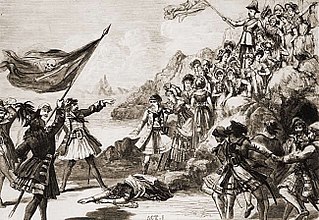
The Pirates of Penzance; or, The Slave of Duty is a comic opera in two acts, with music by Arthur Sullivan and libretto by W. S. Gilbert. Its official premiere was at the Fifth Avenue Theatre in New York City on 31 December 1879, where it was well received by both audiences and critics. Its London debut was on 3 April 1880, at the Opera Comique, where it ran for 363 performances.
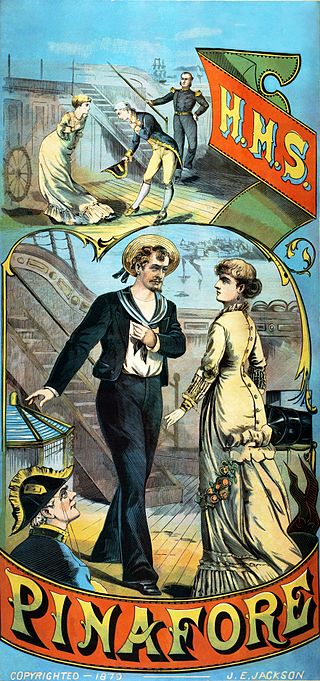
H.M.S. Pinafore; or, The Lass That Loved a Sailor is a comic opera in two acts, with music by Arthur Sullivan and a libretto by W. S. Gilbert. It opened at the Opera Comique in London on 25 May 1878, and ran for 571 performances, which was the second-longest run of any musical theatre piece up to that time. H.M.S. Pinafore was Gilbert and Sullivan's fourth operatic collaboration and their first international sensation.

The Sorcerer is a two-act comic opera, with a libretto by W. S. Gilbert and music by Arthur Sullivan. It was the British duo's third operatic collaboration. The plot of The Sorcerer is based on a Christmas story, An Elixir of Love, that Gilbert wrote for The Graphic magazine in 1876. A young man, Alexis, is obsessed with the idea of love levelling all ranks and social distinctions. To promote his beliefs, he invites the proprietor of J. W. Wells & Co., Family Sorcerers, to brew a love potion. This causes everyone in the village to fall in love with the first person they see and results in the pairing of comically mismatched couples. In the end, Wells must sacrifice his life to break the spell.

Thespis, or The Gods Grown Old, is an operatic extravaganza that was the first collaboration between dramatist W. S. Gilbert and composer Arthur Sullivan. No musical score of Thespis was ever published, and most of the music has been lost. Gilbert and Sullivan went on to become the most famous and successful artistic partnership in Victorian England, creating a string of enduring comic opera hits, including H.M.S. Pinafore, The Pirates of Penzance and The Mikado.

The German Reed Entertainments were founded in 1855 and operated by Thomas German Reed (1817–1888) together with his wife, Priscilla German Reed (1818–1895). At a time when the theatre in London was seen as a disreputable place, the German Reed family provided family-friendly entertainments for forty years, showing that respectable theatre could be popular.

A Sensation Novel is a comic musical play in three acts written by the dramatist W. S. Gilbert, with music composed by Thomas German Reed. It was first performed on 31 January 1871 at the Royal Gallery of Illustration. Only four of German Reed's songs survive. Nearly 25 years later, the music was rewritten and published by Florian Pascal. The story concerns an author suffering from writer's block who finds that the characters in his novel are dissatisfied.

Thomas German Reed, known after 1844 as simply German Reed was an English composer, musical director, actor, singer and theatrical manager of the Victorian era. He was best known for creating the German Reed Entertainments, together with his actress wife, a genre of musical plays that made theatre-going respectable at a time when the stage was considered disreputable.

Ages Ago, sometimes stylised as Ages Ago! or Ages Ago!!, is a musical entertainment with a libretto by W. S. Gilbert and music by Frederic Clay that premiered on 22 November 1869 at the Royal Gallery of Illustration. It marked the beginning of a seven-year collaboration between Gilbert and Clay. The piece was a critical and popular success and was revived many times, including at St. George's Hall, London in 1870 and 1874, and in New York in 1880.

No Cards is a "musical piece in one act" for four characters, written by W. S. Gilbert, with music composed and arranged by Thomas German Reed. It was first produced at the Royal Gallery of Illustration, Lower Regent Street, London, under the management of German Reed, opening on 29 March 1869 and closing on 21 November 1869. The work is a domestic farce of mistaken identities and inept disguises, as two men desperately compete to marry a wealthy young lady. One is young and poor, and the other is a rich miser. Each disguises himself as her guardian.

Fanny Holland was an English singer and comic actress primarily known as the creator of principal soprano roles in numerous German Reed Entertainments.
This is a selected list of W. S. Gilbert's works, including all that have their own Wikipedia articles. For a complete list of Gilbert's dramatic works, see List of W. S. Gilbert dramatic works.
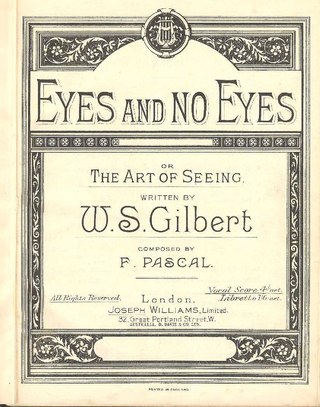
Eyes and No Eyes, or The Art of Seeing is a one-act musical entertainment with a libretto by W. S. Gilbert and music originally by Thomas German Reed. The story concerns two sisters who love flirtatious twin brothers. The sisters lose their uncle's wedding cloak. To avoid his anger, they persuade him that the cloak is magically visible only to true lovers and invisible to flirts.

Dulcamara, or the Little Duck and the Great Quack, is one of the earliest plays written by W.S. Gilbert, his first solo stage success. The work is a musical burlesque of Donizetti's L'Elisir d'Amore, and the music was arranged by Mr. Van Hamme. It opened at the St James's Theatre on 29 December 1866, the last item in a long evening, following a farce and Dion Boucicault's new play Hunted Down. Dulcamara ran for a successful 120 nights.
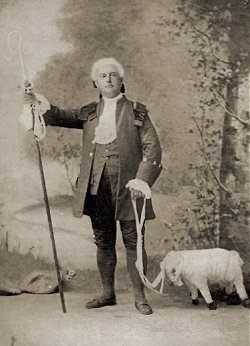
Happy Arcadia is a musical entertainment with a libretto by W. S. Gilbert and music originally by Frederic Clay that premiered on 28 October 1872 at the Royal Gallery of Illustration. It was one of four collaborations between Gilbert and Clay between 1869 and 1876. The music is lost. The piece is a satire on the genre of pastoral plays in which the characters, who each wish that they could be someone else, have their wish granted, with unhappy results.

Sir William Schwenck Gilbert was an English dramatist, librettist, poet and illustrator best known for his collaboration with composer Arthur Sullivan, which produced fourteen comic operas. The most famous of these include H.M.S. Pinafore, The Pirates of Penzance and one of the most frequently performed works in the history of musical theatre, The Mikado. The popularity of these works was supported for over a century by year-round performances of them, in Britain and abroad, by the repertory company that Gilbert, Sullivan and their producer Richard D'Oyly Carte founded, the D'Oyly Carte Opera Company. These Savoy operas are still frequently performed in the English-speaking world and beyond.
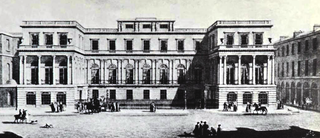
The Royal Gallery of Illustration was a 19th-century performance venue located at 14 Regent Street in London. It was in use between 1850 and 1873.

Robert the Devil, or The Nun, the Dun, and the Son of a Gun is an operatic parody by W. S. Gilbert of Giacomo Meyerbeer's grand opera Robert le diable, which was named after, but bears little resemblance to, the medieval French legend of the same name. Gilbert set new lyrics to tunes by Meyerbeer, Bellini, Offenbach and others.

Arthur Cecil Blunt, better known as Arthur Cecil, was an English actor, comedian, playwright and theatre manager. He is probably best remembered for playing the role of Box in the long-running production of Cox and Box, by Arthur Sullivan and F. C. Burnand, at the Royal Gallery of Illustration.
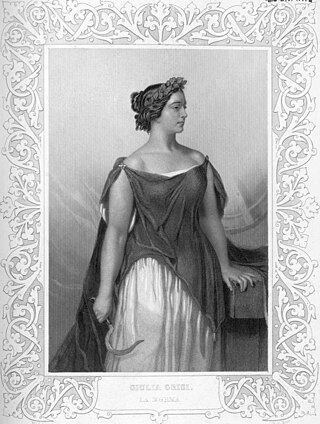
The Pretty Druidess; Or, The Mother, The Maid, and The Mistletoe Bough is an operatic burlesque by W. S. Gilbert. It was produced at the opening of the new Charing Cross Theatre on 19 June 1869 and ran until September of that year.


















